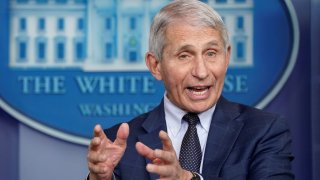
- White House chief medical advisor Dr. Anthony Fauci said studies strongly suggest that booster shots will give you cross protection against a "wide range" of Covid-19 variants, but noted it has not been proven yet.
- Fauci said booster shots "markedly" increase antibody titers against variants of the virus.
- Third shots also increase so-called memory B cells and T cells, a line of defense produced by the immune system to fend off a virus.
White House chief medical advisor Dr. Anthony Fauci on Friday said lab studies strongly suggest that booster shots will give you cross protection against a "wide range" of Covid-19 variants, but noted it has not been proven yet.
Booster shots "markedly" increase antibody titers against variants of the virus, Fauci said at a White House press briefing Friday. Third shots also increase so-called memory B cells and T cells, a line of defense produced by the immune system to fend off a virus.
Memory B cells create antibodies to fight bacteria and viruses, while T cells target and destroy other cells infected with a virus.
"There's every reason to believe that if you get vaccinated and boosted that you would have at least some degree of cross protection," Fauci said. "Very likely against severe disease, even against the omicron variant."
Fauci's remarks come as the world grapples with the new, highly mutated omicron variant of Covid-19.
The variant has some 50 mutations, more than 30 of which are on the spike protein, which is the mechanism used by the virus to attach to human cells. Some of the mutations are associated with higher transmission and a decrease in antibody protection, according to the World Health Organization.
Money Report
The U.S. joins a list of at least 38 countries with confirmed cases of the omicron variant, the World Health Organization on Friday. At least six U.S. states now have more than a dozen cases of the variant after Nebraska officials confirmed six new infections on Friday.
Amid growing concern over omicron, the Centers for Disease Control and Prevention on Monday strengthened its recommendation on Covid-19 booster shots, telling all adults that they "should" get an additional dose. Everyone 18 and older should get an additional shot six months after their initial Pfizer or Moderna series, or two months after their first Johnson & Johnson shot, according to the CDC's new guidance.
Feeling out of the loop? We'll catch you up on the Chicago news you need to know. Sign up for the weekly> Chicago Catch-Up newsletter.
The Biden administration has also encouraged the uptake of Covid-19 vaccine booster shots, promising to provide them for up to 100 million eligible Americans.
To aid the rollout, he promised: "More outreach, more appointments, more hours, more times and sites to walk in."
To date, over 41 million Americans have already received a booster shot, including half of eligible seniors, the White House announced Thursday.
Health officials in the U.S. and worldwide still worry that the omicron variant may reduce the efficacy of vaccines to some degree.
A November study published in the journal Science showed that the Pfizer vaccine's efficacy at preventing infection declined from 86% to 43% from February to October. The study also found Moderna's vaccine dropped from 89% to 58%, and J&J's fell from 86% to 13% against infection.
But Pfizer's booster dose provided 95% protection against symptomatic infection in a clinical trial of 10,000 people.






